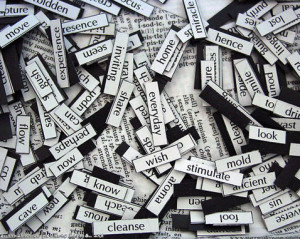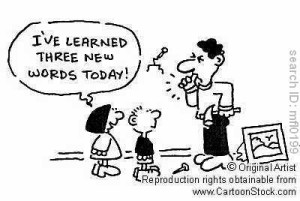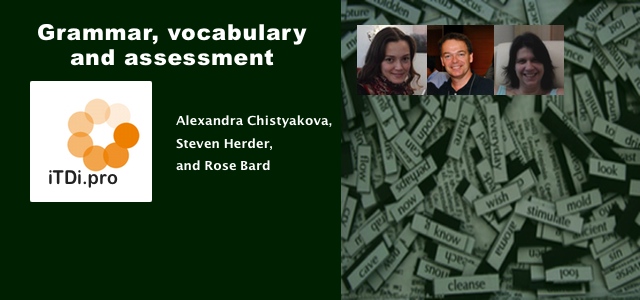
Dream Students and the Rest of Us – Steven Herder
In economics, these days we hear a lot about the 1% and the 99%. In ELT, I also see this division when it comes to learning vocabulary.
Dream students (1%)
There are countless resources – many of them free online – for students who want to increase their vocabulary while learning a second or foreign language. If your students have already made a commitment to improve their vocabulary, and if they also have the skills to make decisions, make a viable plan, follow through on the plan and adjust the plan as necessary, teaching vocabulary is very easy for us teachers.
Here are some great posts and resources for that small percentage of your students who simply need to be pointed in the right direction:

Tips
http://blog.wiziq.com/4-online-vocabulary-resources-for-teachers/
http://www.dcielts.com/ielts-vocabulary/learning-vocabulary-10-tips/
http://www.sheppardsoftware.com/vocabulary_tips.htm
http://www.jocrf.org/resources/EffectiveWays.html
 Vocabulary sites
Vocabulary sites
http://freerice.com/#/english-vocabulary/1483
https://www.vocabulary.com/
http://www.wordengine.jp/
Normal students (99%)
In my experience, however, the vast majority of learners do not fall into that category. Most of my students over the years say they want more vocabulary but haven’t addressed the “who, what, when, where, why, and how” of vocabulary that is needed in order to succeed with vocabulary. Here are a few sets of questions (and answers I’ve heard from some of those Dream students) that your normal students need to answer in order to succeed with vocabulary:
1. Why should I make an effort with to learn more vocabulary?
– It makes you smarter and opens many more doors to your future (especially for those who don’t know exactly what they want to do yet).
– It is the quickest way to raise your score in tests like TOEFL, TOEIC, IELTS, etc.
– It teaches you discipline and you’ll gain confidence.
2. What vocabulary should I learn?
– You need to learn the most frequent words (Top 2000, 3000, 5000, etc).
– You need to decide which words are active and which are passive, then decide which ones YOU need.
– You need to focus on TOEFL words if you are taking the TOEFL test. There are many lists available online.
3. How can I learn vocabulary?
– Spend time with words in order to learn them.
– Use the words you want to learn (Speak and write them a lot).
– Read more than you currently read!
– Learn to notice words you hear but don’t know
4. How can I not give up after three days?
– Make a good plan that will last over time.
– Collaborate in studying vocabulary with your friends.
– Make learning fun by using new words with friends and teachers.
– Develop a system (word cards, smart phone, etc).
– Set goals and get feedback on your progress.
– Talk with your teacher and solicit their ideas.
– Tell your friends, and get them to join you or check up on you to make sure you continue.
5. When can I fit in this extra study plan?
– Make it a habit or routine in your life (at breakfast, on the bus, before you sleep, etc).
– Set daily, weekly goals that are attainable and race to meet your deadlines each day.
– We all have “dead” time or little “chunks” of time throughout the day; we just need to use it.
Once you make a good plan, and get used to doing it, you will begin to see your improvements. As humans, we like to succeed. And the old saying, “Success leads to more success” is very true. Another way of looking at this phenomenon is called the “virtuous cycle” – we make an effort, then we begin to get better, So we get excited and motivated more, this leads us to make more of an effort, and the virtuous cycle continues.
So, if you are a normal student, answer the questions you need to succeed and then go succeed.
I hope some of you will add both questions and answers to this post, because I’m sure there are a ton of other useful ideas out there!













